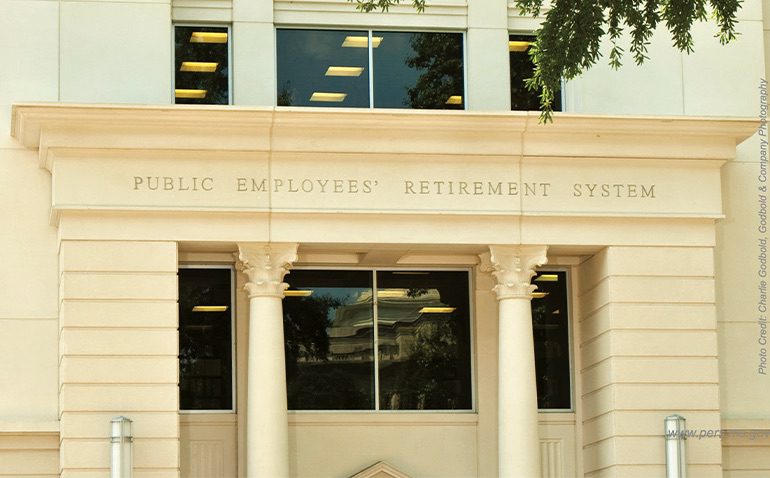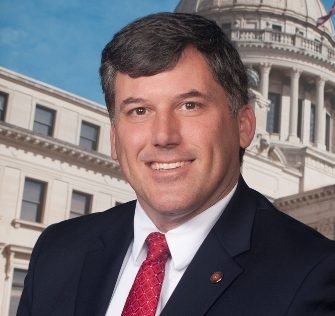
- Questions surround how cities, counties, schools, and other state agencies will absorb a potential employer contribution rate increase.
State Senators heard directly from board members of the Public Employees Retirement System (PERS) on Wednesday in a hearing intended to provide more information regarding the sustainability of the system.
The hearing, conducted by the Senate Government Structure Committee, was chaired by State Senator Chris Johnson (R). He said it was his intention to provide some reassurance to current PERS members as well as retired PERS recipients that their benefits will not be changed.
It was clarified in the hearing that no legislation or action by the PERS Board can lower the benefits for current or existing members of the state retirement plan.
“This board can’t lower anyone’s benefits, can they?” asked State Senator Daniel Sparks (R), a member of the committee.
“That is correct,” said Jay Smith, North Pike School District Superintendent and PERS Board member.
Sen. Sparks said in the hearing that he has received numerous calls from individuals nearing retirement concerned that the plan was in such distress that it would be better for them to pull out what they have now and “go home.”
Senator Johnson said his biggest take away from the meeting was that the PERS system was sound, that retirement benefits are currently going to be paid, and there are no current issues.
“We also got a better understanding of the issues the retirement system faces, a better understanding of how the predictions are made for unfunded liabilities, and are better prepared to address those,” said Johnson.
As the hearing was underway, Lt. Governor Delbert Hosemann (R), the presiding officer in the Senate, took to social media to share his commitment to shoring up PERS.
“To be very clear: I remain committed to protecting all of the retirement benefits of all of our retirees and our current employees,” Hosemann shared on X (formerly Twitter). “I also remain committed to shoring up the retirement system, which the Executive Director has now informed us is $25 billion underfunded, and finding a solution to ensure all benefits will be paid.”
Another topic up for discussion was the House bill (HB 1590) that aims to restructure the PERS Board and prevent a rate increase that is set for July 2024.
The Problem to Solve
Last summer, PERS sounded the alarm that there is an estimated $25 billion in unfunded liability. Proposals from the Board to address that number have been to increase the employer contribution rate and adopt a new tier for future hires.
Smith said, in simple terms, the unfunded liability does not mean that the $25 billion is lost, but that if everyone retired today, the state would be that amount short in paying benefits to those individuals.

Unfunded actuarial accrued liability, or the unfunded liability, is the difference between the retirement system’s assets and the value of benefits already accrued. To determine that number, the state’s actuary uses assumptions based on the fixed contribution rate of 17.40 percent of payroll and the anticipated rate of return of 7.0 percent.
According to information provided in the Senate hearing, the anticipated rate of return has been averaging well over 9.78 percent for the 15-year average, but the Board has moved the projected return from 8.0 percent to 7.0 percent over the last several years.
“When they do that, your liabilities are assumed based on a 25-year look, and so if you lower your anticipated rate of return, you’re saying I don’t think my assets will grow as big, so we are going to need more money in there,” said Senator Johnson.
Sen. Johnson said an increase to 7.5 percent could help elevate some of the cash flow pressure being felt by the plan, despite agreements that a conservative estimate is ideal.
The most recent change by the Board was a decision to phase in a 5 percent employer rate increase over the next three years. In July 2024, employers would see a 2 percent increase, then another 2 percent in 2025, and 1percent in 2026, ultimately landing at 22.4 percent.
For Smith’s own school district’s yearly operating budget, this comes out to be an estimated $750,000 increase.
Senator Sparks questioned Smith as to how his district will absorb that cost. However, no clear way forward was given by the board member.

“My question is, are you aware, who were we relying on to give the information to the Executive Director to come tell the Senate Finance committee that we will be 93.5 percent funded in 25 years?” Sparks asked Smith.
Senator Sparks recalled that in 2022, lawmakers were told by the PERS Board that by 2047 the plan would be 93.5 percent funded.
Actuaries provide information to the PERS Board regarding the assumed rate of return on long-term scales. It was after that date that the Board decided to lower the projected return rate to 7.0 percent. Sparks said that decision to lower the rate inflated the unfunded liability by $6 billion.
“The liability is the benefits we owe people,” said Smith. “We must have a revenue source coming from somewhere; we cannot invest our way out of this problem. I dare to say if the Board changed tomorrow, the math is still the same.”
Randy McCoy, elected to the Board by PERS retirees, was one who voted against the decrease to 7.0 percent. While he agreed with moving toward a more conservative estimate, he said he did not think it should be done as quickly as it was.
McCoy reiterated that the Board has very little control over factors that can impact the plan such as the mortality table, the world economic condition, wars and rumors of wars that disrupt supply chains, and the rate of retirement, to name a few.
“Since 2013 to 2023, we have reduced 13,000 paying people that would be part of PERS. Whether that is because of efficiency motives, reduction in force, outsourcing – the unintended consequence of that is a direct impact to PERS,” said McCoy.
He said the reduction in employment over 20 years has exacerbated the PERS issue.

McCoy said he often focuses on the cash flow as the more critical element of the program. The cash flow includes the three revenue streams: employee contributions, employer contributions, and investment returns compared to what is being paid out in current benefits.
He said since the U.S. has changed primary footing in the world economy, it has pulled the countries numbers more toward the mean, thus a lower rate of return.
Toby Barker, Mayor of the City of Hattiesburg Mayor and a former State Representative, is the President of the Mississippi Municipal League (MML). He also spoke to the Senate committee in support of preventing the rate increase.
“Increasing the employer share at five points actually equates to a 28 percent increase in employer costs for cities, counties, state agencies and school districts,” said Barker.

Actuaries have recommended that the rate continue increasing to 27.4 percent over the next 10 years.
Mayor Barker said for a city like Hattiesburg that will require his city to come up with close to $3 million yearly to cover retirement contributions for existing employees. He encouraged lawmakers to call their mayor, county clerk or school superintendent to ask them how much it will cost if and when they have to pay that 27.4 percent.
“Then ask your mayor where they plan on finding that money. Raising property taxes, yes, probably multiple times. Cutting services and employees, absolutely, which by the way makes the PERS problem even worse because you have fewer employees paying into the system,” said Barker.
He said this will also put limitations on future raises for employees.
About the House Bill
As previously reported by Magnolia Tribune, the Mississippi House of Representatives passed legislation recently to restructure the PERS Board, largely as a means to get a “new set of eyes” on the system.
The PERS Board as it is comprised now mostly consists of government employees and retirees elected to serve by their peers. HB 1590 would reconstitute how the PERS Board is organized, filling it with 11 members, to include four to be appointed by the Governor, three to be appointed by the Lt. Governor, the State Treasurer, the Commissioner of the Department of Revenue, one current employee, and one current PERS retiree. The Speaker of the House would also have the option of recommending two of the Governor’s appointees and two of the three appointees from the Lt. Governor.
“For years now, the unfunded portion of our retirement plan has continued to increase while the funded portion continues to decrease. House Bill 1590 will bring a new set of eyes to look at the plan in its entirety while maintaining representation from present employees and retirees,” said State Rep. Hank Zuber (R), the bill’s author.
The legislation also nixes the 2 percent increase planned for July 2024.
The bill passed in the House by a vote of 85 to 34.
READ MORE: House seeks new set of eyes on PERS Board
While the MML does not believe HB 1590 will fix all the problems, they are in support of preventing the 2 percent rate increase in order to curb the reality of raising taxes.
“Rescinding the 2% employer increase will help local governments tremendously and help prevent cuts to municipal services, reductions in workforce and potential local tax increases,” MML stated in a letter shared by Speaker of the House Jason White (R).
Other groups across the state have spoken out in support of the House legislation, saying it is protecting employers from the rate increases.
Most recently, a letter of support was put out by the Mississippi Association of Supervisors (MAS) who applauded lawmakers in their efforts to address the concerns of PERS.
“As with school systems, college systems, state government systems, and municipal systems, Mississippi county governments represent a substantial number of PERS participants. While we acknowledge the importance of securing PERS for retirees, current employees, and future employees, the substantial rate hike and planned rate hikes will impact county budgets greatly and could possibly lead to higher tax rates,” stated the MAS.
The members of the Mississippi Realtors, who represent more than 8,000 individuals, said that it is a long-standing advocacy policy of their group to keep an eye on legislation that could put pressure on property taxes.
“Municipal and County elected officials have grave concerns about the ability of the limited resources available to cover the escalating employer costs of their participation in PERS, and the potential for local property tax increases is concerning to the Mississippi Realtors. A delay in the 2% employer increase, for instance, would help avoid local tax increases,” read the letter to lawmakers.
Current market interest rates, affordability and limited inventory are already causing daily concerns for potential homeowners.










